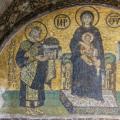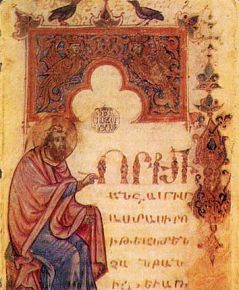302. On the Eastern Front: Philosophy in Syriac and Armenian
Eastern Christian philosophy outside of Constantinople, focusing on translation and exegesis in the languages of Syriac and Armenian.
Themes:
• Y. Arzhanov, “Plato in Syriac Literature,” Le Muséon 132 (2019), 1-36.
• A. Baumstark, Geschichte der syrischen Literatur (Bonn: 1922).
• S. Brock, Syrian Perspectives on Late Antiquity (London: 1984).
• S. Brock, “The Syriac Commentary Tradition,” in C. Burnett (ed.), Glosses and Commentaries on Aristotelian Logical Texts (London: 1993), 3-18.
• V. Calzolari and J. Barnes (ed.), L’oeuvre de David l’Invincible (Leiden: 2009).
• H. Daiber, “The Syriac Tradition in the Early Islamic Era,” in U. Rudolph, R. Hansberger, and P. Adamson (eds), Philosophy in the Islamic World: 8th-10th Century (Leiden: 2016), 74-94.
• N. Garsoïan, T. Mathews, and R.W. Thomson (eds), East of Byzantium: Syria and Armenia in the Formative Period (Dumbarton Oaks: 1982).
• D. Gutas, “Paul the Persian on the Classification of the Parts of Aristotle’s Philosophy: a Milestone between Alexandria and Baghdād,” Der Islam 60 (1983), 231-67.
• H. Hugonnard-Roche, La logique d’Aristote du grec au syriaque (Paris: 2004).
• D. King, “Logic in the Service of Ancient Eastern Christianity: An Exploration of Motives,” Archiv Für Geschichte Der Philosophie 97 (2015), 1-33.
• M.P. Penn et al. (eds), Invitation to Syriac Christianity: an Anthology (Berkeley: 2022).
• H. Takahashi, “Between Greek and Arabic: the Sciences in Syriac from Severus Sebokht to Barhebraeus,” in H. Kobayashi and M. Kato (eds), Transmission of Sciences: Greek, Syriac, Arabic and Latin (Tokyo: 2010), 16-39.
• É. Villey (ed.), Les sciences en syriaque (Paris: 2014).
• J.W. Watt, Rhetoric and Philosophy from Greek into Syriac (Farnham: 2010).






Comments
Mild Correction
Being a member of Syrian Church in India and studied the history of church to some extent from my perspective, I would like to offer a small correction. Yes, non-Chalcedonian Christians in Syriac speaking regions were called Jacobites in the centuries later than Jacob Baradaeus because he was a such an influence in sustaining the church against persecutions from the dominant Chalcedonian faction in the Byzantine during the time. But he was not the originator. Non-Chalcedonians were there in regions of both Alexandria and Antioch within Byzantine empire along with Chalcedonians even before Jacob Baradaeus right from the time of Synod of Chalcedon at 451 CE. I would put the real leader of the non-Chalcedonian movement to be Dioscorus of Alexandria, then Patriarch of Alexandria who disagreed strongly with decisions of Synod of Chalcdeon and hence was deposed and held a heretic by Chalcedonian faction and non-Chalcedonians both in Alexandria and Antioch rallied around him from that point of time onwards. But non-Chalcedonian faction was then a bigger movement in Alexandria compared to Antioch.
In reply to Mild Correction by John Thomas
Jacobites
Right, I didn't necessarily mean to give Jacob a founding role - I just wanted listeners to know what "Jacobite" means if they come across the word. What I say in the script is: that the Monophysites were "also called Jacobites after the sixth century bishop of Edessa." You're not saying that's false, right? I am just wondering if I need to change it for the book version, or whether you are just pointing out some extra background that I didn't cover.
Thanks for the feedback, it's good to have such expert listeners!
In reply to Jacobites by Peter Adamson
You are right there. They
You are right there. They were called by the Chalcedonians (both Eastern Orthodox and Roman Catholics) in the region as Jacobites after sixth centry due to being the followers of Jacob Baradaeus. Non-Chalcedonians treated that as an insult as their movement was there even before. Seems like I got the wrong impression when I listened at first that you were implying that Jacob was the originator of non-Chalcedonian movement.
In reply to You are right there. They by John Thomas
Non-Chalcedonians
OK, thanks!
Armenian Plato translations
Another great episiode! I just wanted to comment on the translations on Plato that were attributed to David the Invincible. There are actually six extant medieval Armenian translations of Platonic or dialogues: the Apology, Euthyphro, Phaedo, Timaeus, Laws, and (the pseudo-Platonic) Minos, and some scholars consider them to be a product of the Hellenizing School that in the 6th-8th century translated Greek texts into Armenian and with which David is usually associated . Others however argue that they are the work of an 11th century scholar named Grigor Magistros Pahlavuni. Calzolari brielfy mentions these translations in her article in the Calzolari and Barnes volume (p. 18-19) with reference to earlier work on them.
In reply to Armenian Plato translations by Michael Papazian
Extant Armenian Plato
Really! Wow, that's really good to know, thank you. I will add a note to mention this in the book version - I should really have picked up on this because I re-read the Calzolari and Barnes while working on the episode.
Syriac
You mention in the podcast that there's a 6th century account of a woman who is dissapointed that her son's pale complexion is from reading the Psalms in Syriac rather than the liberal arts. What's the source of this?
Thanks
In reply to Syriac by Jacob
Pale complexion
Oh sorry, I missed this comment until just now. The story is told at S. Brock, Syrian Perspectives on Late Antiquity (London: 1984), in article V. It's a good one, isn't it?
Add new comment